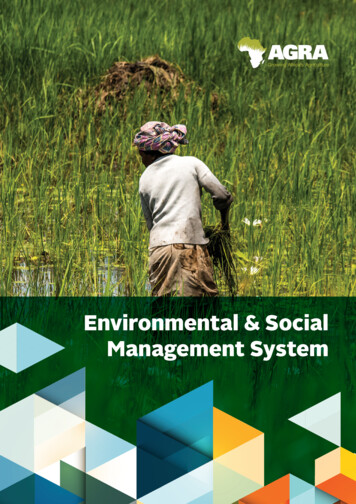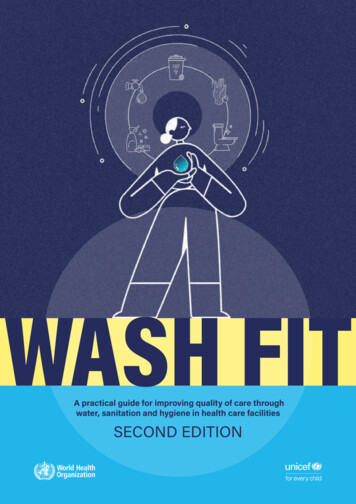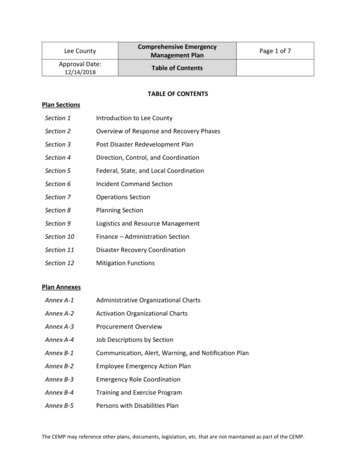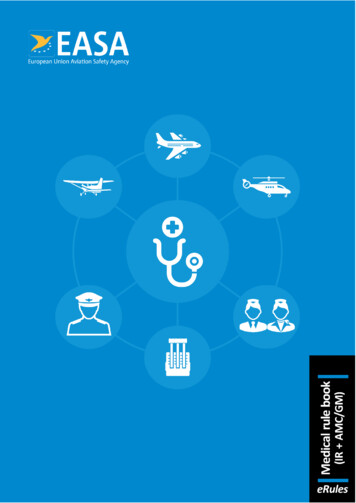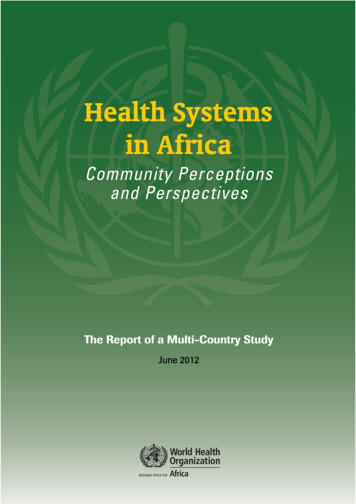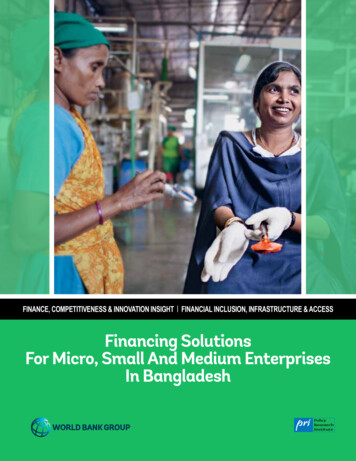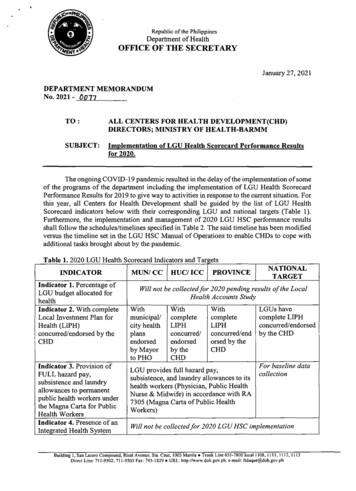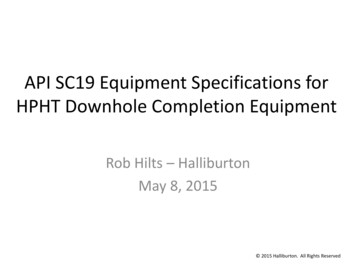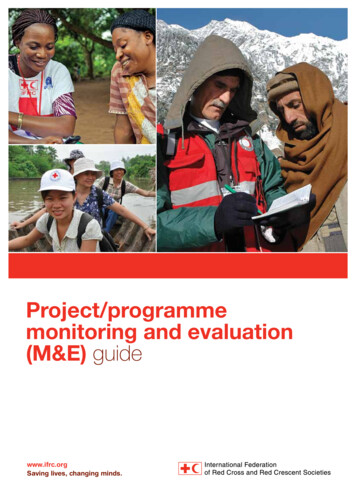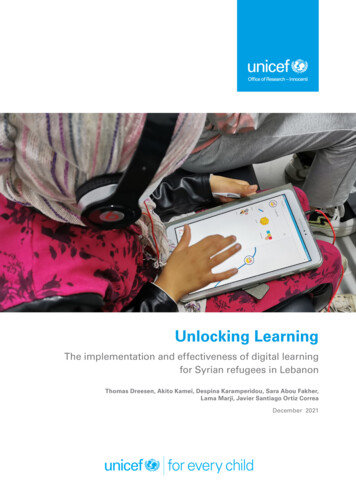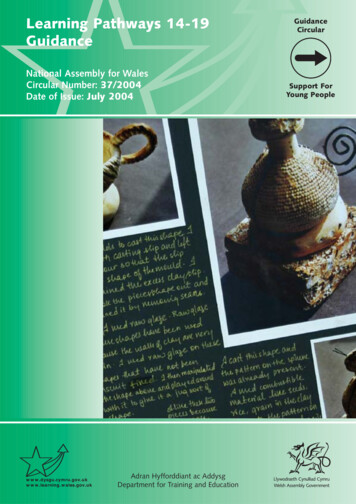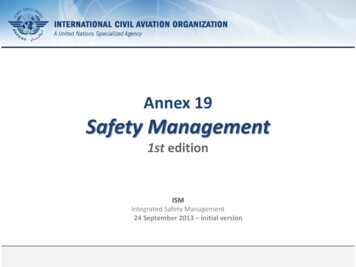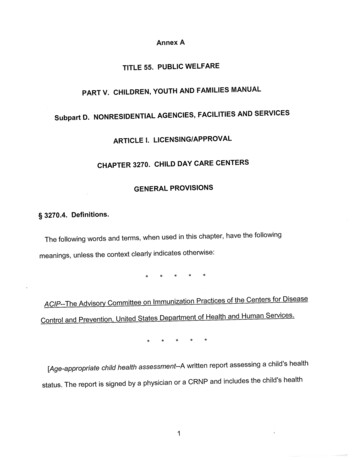
Transcription
Annex ATITLE 55. PUBLIC WELFAREMANUALPART V. CHILDREN, YOUTH AND FAMILIESFACILITIES AND SERVICESSubpart D. NONRESIDENTIAL AGENCIES,ARTICLE 1 . LICE NSING/APPROVALCHAPTER 3270 . CHILD DAY CARE CENTERSGENERAL PROVISIONS§ 3270.4. Definitions .chapter, have the followingThe following words and terms, when used in thismeanings, unless the context clearly indicates otherwise:Practices of the Centers for DiseaseACIP--The Advisory Committee on Immunizationof Health and Human Services .Control and Prevention United States Departmentassessing a child's health[Age-appropriate child health assessment--A written reportCRNP and includes the child's healthstatus . The report is signed by a physician or a
history, the child's physical examination and a plan for treatment of health problemsidentified in the health assessment.]Age level--The grouping category appropriate for the child's age .(i) Infant--A child from birth [through 12 months] to 1 year of age .(ii) Young toddler--A child from [13 through 24 months] 1 to 2 years of age .(iii) Older toddler--A child from [25 through 36 months] 2 to 3 years of age .(iv) Preschool child--A child from [37 months of age through] 3 years of age to thedate the child enters [1st grade of] kindergarten in a public or private school system .(v) Young school-age child--A child [from the 1 st grade through the 3rd] who attendskindergarten to the date the child enters the 4th grade of a public or private schoolsystem .(vi) Older school-age child--A child [from] who attends the 4th grade of a public orprivate school system through 15 years of age .Child with [a disability] special needs--A child who [does not function according toage-appropriate expectations in the areas of emotional, cognitive, communicative,perceptual-motor, physical or social development and requires special adaptations,program adjustments and related services on a regular basis to function in an adaptivemanner . Examples of a child with a disability include a child who has :
(i) A developmental delay .(ii) A neurologically-based condition, such as mental retardation, cerebral palsy,autism, epilepsy or another condition closely related to mental retardation or requiringtreatment similar to that required by mentally retarded children .(iii) Mental retardation associated with sociocultural or psychosocial disadvantage .(iv) A genetic disorder or physiological condition usually associated with mentalretardation .(v) Problems of social or emotional adjustment.(vi) A physical disability such as visual impairment, hearing impairment, speech orlanguage impairment, or a physical handicap.] has one or more of the following :(i) A disability or developmental delaV identified on anPfor IEP, anIFSP OR A SERVICEAGREEMENT .(ii) A formal WRITTEN behavioral plan that has been determined by a licensedphysician, PsvehJatris Gr licensed psychologist OR CERTIFIED BEHAVIOR ANALYST(iii) A chronic health condition diagnosed by a licensed physician, physician'sassistant or CRNP that requires health and related services of a type or amount beyondthat required by children generally.
IEP- INDIVIDUALIZED EDUCATION PROGRAM AS DEFINED IN 22 PA.CODE §14.101 (RELATING TO DEFINITIONS) AND §§ 14 .131-14.133 (RELATING TO IEP;ESY; AND BEHAVIOR SUPPORT) .IFSP- INDIVIDUALIZED FAMILY SERVICE PLAN AS DEFINED IN 55 PA.CODE§4226 .5 (RELATING TO DEFINITIONS) AND §§ 4226.71-4226 .77.Inspection summary--A document prepared by an agent of the Department describingeach regulatory noncompliance item confirmed as a result of a facility inspection .SERVICE AGREEMENT- A SERVICE AGREEMENT AS DEFINED IN 22 PA.CODE§ 15.2 AND §15.7 (RELATING TO DEFINITIONS ; AND SERVICE AGREEMENT) .GENERAL REQUIREMENTS§ 3270.11 . Application for and issuance of a certificate of compliance.(b) A legal entity or a representative of the legal entity shall participate in a precertification orientation trainingprovided by the Department within 12 months prior toissuance of a certificate of compliance. The precertification orientation does not count
toward the annual minimum of 6 hours of child care training required in 3270 .31(e)(relating to age and traini ng) .,(cj Application for a certificate of compliance shall be submitted to the appropriateregional day care office in accordance with Chapter 20 (relating to the licensure orapproval of facilities and agencies) .[(c)] (d)[(d)] (e)[(e)] (f)[(g)]1992,] W A facility whose certificate of compliance is current as of [April 4,(Editor's Note : The blank refers to the effective date of adoption of thisfinal-form rulemaking .) will not be inspected under this chapter until the currentcertificate of compliance is due to be renewed or when a regulatory violation is allegedand the Department responds to the alleged violation with an inspection.§ 3270 .15 . [Firesafety approval] Certificate of occupancy :A certificate of compliance will not be granted by the Department until the legal entityprovides a certificate of occupancy as proof of compliance with the applicablerequirements of the Department of Labor and Industry [at] in 34 Pa. Code [Chapter 54
(relating to Group B educational) or local authorities in Scranton, Pittsburgh orPhiladelphia] 403 .23 (relating to child day care facilities) .§ 3270.17 . Service to a child with [a disability] special needs .[A facility serving a child with a disability as defined in § 3270.4 (relating to definitions)shall also comply with applicable sections of Chapter 3300 (relating to specialized daycare service for children with disabilities) .](a) The operator shall make reasonable accommodation to include a child withspecial needs in accordance withr o12101 12213) APPLICABLE FEDERAL AND STATE LAWS REGARDINGDISABILITY DISCRIMINATION.(b) The operator shall permit an adult individual who provides specialized services toa child with special needs to provide those services on the facilitv premises as specifiedin the child'sI FSPIEP,a-i.OR WRITTEN behavioral plan(c) The operator is responsible to make staff persons aware of community resourcesfor the family of a child with possible special needs.(1) When the director HAS REASON TO believes a child may need an assessmentdue to develo pmental, behavioral or health concerns, the director shall inform the child's
parent of the concern and provide information to the parent regarding resources forreferral and assistance .(2) When a staff person HAS REASON TO believes a child may need an assessmentdue to developmental, behavioral or health concerns, the staff person shall inform thedirector. The director shall inform the child's parent of the staff person's concern andprovide information to the parent regarding resources for referral and assistance .§ 3270.24 . Departmental access .(c) An agent of the Department w 4 IS AUTHORIZED TO inspect for compliance withthis chapter in all areas of the facility premises that are accessible to children .§ 3270.25 . Availability of certificate of compliance and applicable regulations .(a) The facility's current certificate of compliance and a copy of the applicableregulations under which the facility is certified shall be posted in a conspicuous locationused by parents, with instructions for contacting the appropriate regional day care officeposted at the same location .(b) The operator shall post a copy of each inspection summary issued btheDepartment next to the facility's certificate of compliance in a conspicuous location usedby parents . The inspection summary shall remain posted until an agent of theDepartment verifies that each regulatorV noncompliance item cited on the inspectionsummary has been corrected .
§ 3270.27 . Emergency plan.(a) The facility shall have an emergency plan that provides fo r:(1) Shelter of children during an emergency INCLUDING SHELTER IN PLACE ATTHE FACILITY AND SHELTER AT LOCATIONS AWAY FROM THE FACILITYPREMISES.(22) Evacuation of children from the facility BUILDING AND EVACUATION OFCHILDREN TO A LOCATION AWAY FROM THE FACILITY PREMISES . THEEVACUATION ROUTES AND EVACUATION PLANS TO EXIT THE BUILDING MAYBE THE SAME AS THOSE REQUIRED BY § 3270.94 (F) AND (G) (RELATING TOFIRE DRILLS) .(3) A method for facility persons to contact parents as soon as reasonably possiblewhen an emergency situation arises .(4) A method for facility persons to inform parents that the emergency has ended andto provide instruction as to how parents can safely be reunited with their children .(b) The operator shall review the emergency plan at least annually and update theplan as needed . Each review and update of the emergency plan shall be documented inwriting and kept on file at the facility .(c) Each facility person shall receive training regarding the emergency plan at thetime of initial employment, on an annual basis and at the time of each plan update . The
date of each training and the name of each facility person who received the trainingshall be documented in writing and kept on file at the facility .(d) The emergency plan shall be posted in the facility at a conspicuous location .(e) The operator shall provide to the parent of each enrolled child a letter explainingthe emergency procedures described in subsection (a) . The operator shall also provideto the parent of each enrolled child a letter explaining any subsequent update to theplan .(f) The operator shall send a copy of the emergency plan and subsequent planUPDATES to the county emerg ency management agency.FACILITY PERSONS§ 3270 .31 . Age and training .(d) CHILD CARE PROFESSIONAL CREDENTIALS ARE EQUIVALENT TO THESTAFF QUALIFICATIONS LISTED BELOW:(1) A Child Development Associate (CDA) credential or a Certified ChildcareProfessional (CCP) credential ;isequivalent to [one of the following :(1) Fifteen] 9 credit hours from an accredited college or university in early childhoodeducation or child development and 1 year of experience with children .
[(2) Thirty credit hours from an accredited college or university in early childhoodeducation or child development.](2) A PENNSYLVANIA SCHOOL-AGE PROFESSIONAL CREDENTIAL ISEQUIVALENT TO 9 CREDIT HOURS FROM AN ACCREDITED COLLEGE ORUNIVERSITY IN ELEMENTARY EDUCATION OR CHILD DEVELOPMENT AND 1YEAR OF EXPERIENCE WITH CHILDREN .STAFF-CHILD RATIO§ 3270 .52. Mixed age level .When children are grouped in mixed age levels, [the following child group sizes andratios of staff persons apply:] the age of the Voungest child in the group determines thestaichild ratio and maximum group size in accordance with the requirements in3270 .51 (relating to similar age level) .MaximumGroup[Mixed Age LevelsInfant/young or olderTotal Number of Staff Required forStaff Children Size*the Maximum Group Size14821482toddlerInfant/preschool
Young toddler/ preschool15102Older toddler/ preschool16122Preschool/young or older110202school-age*No more than 50% of each group may be of the older age level .]PHYSICAL SITE§ 3270 .61 . Measurement and use of indoor child care space.(h) The capacity established for an indoor space may not be exceeded except [at] inthe following situations :1At naptime, when toddler or preschool children are resting on rest equipmentdescribed in § 3270 .106 (relating to rest equipment)[.] if the following conditions aremet:(2) When older toddler, preschool or school-age children are participating in aprogram activity if the following conditions are met:
(i) The capacity of the indoor child care space may be exceeded for no more than twoseparate 1/2 hour time periods daily.(ii) Each time period shall be designated on the facility's schedule of daily activities .(iii) The space may not be occupied by children of the infant or young toddler agelevels during a time period when the capacity is exceeded .(iv) The number of children present in the space may not be more than twice themeasured capac ity of the space.(3) When a meal is served in a space designated and measured as indoor child carespace if the following co nditions are met:(i) The capacity of a space may be exceeded when children are eating for no morethan 1 hour daily.(ii) The meal time shall be designated on the facility's schedule of daily activities .NO The number of children present in the space may not be more than twice themeasured capac ity of the space .(i) The total number of children receiving child day care services at the facility at anyone time may not exceed the maximum capacity stated on the facility's certificate ofcompliance .§ 3270 .70. Indoor temperature.
(b) If the indoor temperature exceeds [85 ] 82 F in a child care space, a means ofmechanical air circulation shall be operating .§ 3270 .75. First-aid kit .(c) A first-aid kit [shall] must contain the following : soap, an assortment of adhesivebandages, sterile gauze pads, tweezers, tape, scissors and [Syrup of Ipecac]disposable, nonporous gloves . [Instructions for use of the Syrup of Ipecac shall beincluded as described at § 3270 .133(9) (relating to child medication and special diets) .](d) One first-aid kit per child care group [shall] must accompany children and facilitypersons on excursions from the facility . Each first aid kit taken on an excursion mustcontain a bottle of water in addition to the items specified at subsecti on (c) .§ 3270 .82. Toilet areas.(f) Toilets and training chairs may not be located in an area used for cooking oreating . [If the toilet area is not on the same floor as the child care space, an adult shallaccompany toddler and preschool children going to and from the toilet area .]
EQUIPMENT§ 3270 .102 . Condition of play equipment.(c) Outdoor equipment that requires embedded mounting [shall] must be mountedover [at least 6 inches of loose-filled, impact-absorbing materials,] a loose-fill or unitaryplayground protective surface covering that meets the recommendations of the UnitedStates Consumer Product Safety Commission. The equipment must be anchored firmlyand be in good repair .(g) Children's equipment and toys described as hazardous by the United StatesConsumer Product Safety Commission may not be used by children at the facilitymay not be on the premises at the facili ty.§ 3270 .104. Furniture.(a) Furniture [shall] must be durable, safe, easily cleaned and appropriate for thechild's size, age and [disability] special needs .§ 3270 .106. Rest equipment.
(J) TOYS, BUMPER PADS, OR PILLOWS MAY NOT BE PRESENT IN A CRIB WHILEAN INFANT IS SLEEPING IN THE CRIB .PROGRAM§ 3270.113. Supervision of children.(a) Children on the facility premises and on facility excursions off the premises shallbe supervised by a staff person at all times . Outdoor play space used by the facility isconsidered part of the facility premises .(1) Each staff person shall be assigned the responsibility for supervision of specificchildren . The staff person shall know the names and whereabouts of the children in hisassigned group . The staff person shall be physically present with the children in hisgroup on the facility premises and on facility excursions off the facility premises.(2) The requirement for supervision on and off the facility premises includescompliance with the staichild ratio requirements in §§ 3270.51--3270 .54 3270 .55 .(e) A facility person may not restrain a child by using bonds ties or straps to restrict achild's movement or by enclosing the child in a confined space closet or locked room .
The prohibition against restraining a child does not apply to the use of adaptiveequipment prescribed for a child with special needs .§ 3270.115. Water activity .(a) Swimming.(3) An aboveground swimming pool which is not in use [shall] must be madeinaccessible to children in accordance with the swimming pool barrier guidelines of theUnited States Consumer Product Safety Commission.§ 3270 .117. Release of children.(a) A child shall be released only to the child's parent or to an individual designated inwriting by the enrolling parent. A child shall be released to either parent unless a courtorder on file at the facility states otherwise .4 3270.119 . PreciramPROGRESS CHECKLIST .
THE FACILITY SHALLCOMPLETE A SEMI-ANNUAL PROGRESS CHECKLIST FOR EACH INFANT,TODDLER AND PRESCHOOL CHILD AND FOR EACH SCHOOL-AGE CHILD WHOATTENDS THE FACILITY MORE THAN 15 HOURS PER WEEK .THE PROGRESSCHECKLIST MUST BE COMPLETED ON A FORM APPROVED BY THEDEPARTMENT . THE DEPARTMENT WILL PROVIDE A LIST OF APPROVEDFORMS .
(1)Perv anu infant, tndrllor er nrocnhnnl nhilrl the pl an &hallbereviewedatleast, o ioni6. v- mnrr,vrnthcm--rsHE DIRECTOR OR GROUP SUPERVISORSHALL DATE AND SIGN THE CHILD'S PROGRESS CHECKLIST. THE CHILD'SPARENT SHALL BE GIVEN AN OPPORTUNITY TO SIGN AND RECEIVE A COPY OFEACH PROGRESS CHECKLIST.A SIGNED AND DATED COPY OF THE PROGRESSCHECKLIST MUST BE PLACED IN THE CHILD'S FACILITY RECORD .(1) TheG-hmld's-pareRt.
/ A\e-cr-rrranhild -n-crn.if the nhil TTj Thecr rrdis Q Gt7Vt7rel a,heageageGA FACILITY THAT PARTICIPATES INTHE DEVELOPMENT OF THE CHILD'S IEP OR IFSP AND HAS A COPY OF THE IEPOR IFSP ON FILE IN THE CHILD'S RECORD IS EXEMPT FROM COMPLETING THESEMI-ANNUAL PROGRESS CHECKLIST .N vN uplan .3270 .120 . Infant sleep position .Infants shall be placedertheir haGI(s te sleep IN THE SLEEPING POSITIONRECOMMENDED BY THE AMERICAN ACADEMY OF PEDIATRICS unless there is amedical reason an infant should not sleep in this position. The medical reason shall bedocumented in a statement signed by a physician, physician's assistant or CRNP andplaced in the child's record at the facility .PROCEDURES FOR ADMISSION§ 3270.122.Admission interview .A child shall be interviewed or observed by the operator and when possible shall havethe opportunity to visit the facility prior to being admitted for care. The child shall be told19
as much about the service being planned as he can understand . If the parent indicatesthat the child has a [disability or handicapping condition] special need , the operator shalldiscuss the condition with the parent, refer to § 3270 .4 (relating to definitions), andcomply with §§ 3270.17, 3270.124 and 3270 .131 (relating to service to a child with [adisability] special needs ; emergency contact information; and health [assessment]information ).§ 3270.124. Emergency contact information .(b) Emergency contact information [shall] must include the following :(5) Information on the [disability of the childl child's special needs, as specified by thechild's parent [or], physician, physician's assistant or CRNP , which is needed in anemergency situation .CHILD HEALTH§ 3270 .131 . Health [assessment] information.(a) [An] The operator shall require the parent of an enrolled child, including a child, afoster child and a relative of an operator or a facility person, [shall have an age-
appropriate] to provide an initial health report [on record at the facility] no later than 60days following [enrollment] the first day of attendance at the facility.(1) The initial health report for an infant must be dated no more than 3 months prior tothe first day of attendance at the facility.(2) The initial health report for a oun toddler must be dated no more than 6 monthsprior to the first day of attendance at the facility.(3) The initial health report for an older toddler or preschool child shall be dated nomore than 1 year prior to the first day of attendance at the facility.(4) The initial health report for a school-age child must be dated in accordance withthe requirements for medical examinations for school attendance in 28 Pa . Code23.2(relating to medical examinations) .(b) [An age-appropriate health assessment shall be conducted according to therecommended schedule for routine health supervision as referenced in the most currentedition of the American Academy of Pediatrics (AAP) Guidelines for Health Supervision.This publication can be obtained from the American Academy of Pediatrics, 141Northwest Point Boulevard, Post Office Box 927, Elk Grove Village, Illinois 60007.] Theoperator shall require the parent to provide an updated health report in accordance withthe following sched ules :(1) At least every 6 months for an infant or young toddler.(2) At least every 12 months for an older toddler or preschool child .21
(c) A health [assessment shall be conducted and a] report [shall] must be written andsigned by a physician , physician's assistant or a CRNP . The signature [shall] mustinclude the individual's professional title .(d) The health report shall include the following information:(1) A review of the child's [previous] health history.(2) [The results of a physical examination] A list of the child's allergies .(3) [An assessment of the child's growth patterns] A list of the child's currentmedication and the reason for the medication .(4) [The physician's or CRNP's] An assessment of [a disability or a] an acute orchronic health problem or special need and recommendations for treatment or services ,INCLUDING INFORMATION REGARDING ABNORMAL RESULTS OF SCREENINGTESTS FOR VISION, HEARING OR LEAD POISONING .(5) A review of the child's immunized status according to recommendations of the[AAP] ACIP. [The Department will provide the AAP guidelines upon request.](7) [A review of age-appropriate screenings according to the standards of the AAPJ Astatement that the child is able to participate in child care and appears to be free fromcontagious or communicable disease .22
(8) A STATEMENT THAT AGE-APPROPRIATE SCREENINGS RECOMMENDEDBY THE AMERICAN ACADEMY OF PEDIATRICS WERE CONDUCTED SINCE THETIME OF THE PREVIOUS HEALTH REPORT REQUIRED BY THIS SECTION .(e) [The operator shall comply with the Department of Health (DOH) regulation at 28Pa. Code § 27.121 a (Reserved) and shall implement dismissal policies in accordancewith that section. The Department will provide the DOH regulation upon request.] Thefacility may not accept or retain an infant 2 months of age or older, a toddler or apreschool child at the facility for more than 60 days following the first day of attendanceat the facility unless the parent provides written verification from a physician, physician'sassistant, CRNP, the Department of Health or a local health department of the dates(month, day and year) the child was administered immunizations in accordance with therecommendations of the ACIP .(1) The facility shall require the parent to provide updated written verification from aphysician, physician's assistant, CRNP, the Department of Health or a local healthdepartment of ongoing vaccines administered to an infant, toddler or preschool child inaccordance with the schedule recommended by the ACIP.(2) Exemption from immunization must be documented as follows :(i) Exemption from immunization for religious belief or strong personal objectionequated to a religious belief shall be documented by a written, signed and datedstatement from the child's parent or guardian . The statement shall be kept in the child'srecord .
(ii) Exemption from immunization for reasons of medical need must be documentedby a written, signed and dated statement from the child's physician, physician'sassistant or CRNP. The statement shall be kept in the child's record .(3) The facility shall implement dismissal policies in accordance with the Departmentof Health regulation in 28 Pa . Code § 27 .77 (relating to immunization requirements forchildren in child care group settings) .(4) The facility shall comply with the annual immunization reporting requirements inaccordance with the Department of Health regulation in 28 Pa . Code § 27.77 .§ 3270.133. Child medication and special diets .The operator shall make reasonable accommodation in accordance with tl4efi n -i4rv,oricnrnerr arnc With I'lic"D hili iacesorrrcGfAGcrrvu-e sa-f1990/ono( coy)r'.Aom U .Sc .o n- 1210'I2213) 1 ' ')'I'Z\/n42(APPLICABLE FEDERAL AND STATE LAWS REGARDING DISABILITYDISCRIMINATION to facilitate administration of medication or a special diet THAT ISprescribed by a physician, physician's assistant or CRNP far a hoed h ASTREATMENT RELATED TO THE CHILD'S special needs . Facility persons are notrequired to administer [child] medication or special diets which are requested orrequired by a parent, a physician , a physician's assistant or a CRNPeve BUT ARE NOT TREATMENT RELATED TO THE CHILD'S special needs . [Ifchild] When medication or special diets are administered, the following requirementsapply :
[(9) A staff person who administers Syrup of Ipecac shall request case-specificinstruction for administration from a poison control center or a physician . The staffperson shall record in the child's file the date and time instruction was received, thename of the individual who issued the instruction, the content of the information and thetime, date and amount of Syrup of Ipecac administered .]§ 3270 .135. Diapering requirements.(a) When children are diapered, the facility shall use disposable diapers, a diaperservice or arrange with the parent to provide a daily diaper supply .(3) If disposable diapers are provided by a parent or by a facility, a soiled diaper shallbe discarded [in one of the following ways] by immediately pg the diaper into a,plastic-lined, hands-free covered can. [The diaper shall be :(i) immediately placed into a lined outdoor trash container .(ii) Placed in an individual, tied bag and discarded indoors until outdoor disposal ispossible .](e) A staff person shall check a child's diaper at least every 2 hours and whenever thechild indicates discomfort or exhibits behavior that suggests a soiled diaper. A staffperson shall chan ge a child's diaper when the diaper is soiled.
ADULT HEALTH§ 3270 .151 . Health assessment.(a) A facility person providing direct care who comes into contact with the children orwho works with food preparation shall have a health assessment conducted within [3]12 months prior to providing initial service in a child care setting and every [year] 24months thereafter. A health assessment is valid for [12] 24 months following the date ofsignature, if the person does not contract a communicable disease or develop a medicalproblem .(b) A health assessment shall be conducted and a report shall be written and signedby a physician, physician's assistant or CRNP . The signature [shall] must include theindividual's professional title.(c) The health assessment [shall] must include the following :(2) Tuberculosis screening by the Mantoux method at initial employment [andsubsequently at least once every 2 years] . Subsequent tuberculosis screening is notrequired unless directed by a physician, physician's assistant, CRNP, the Department ofHealth or a local health department.
TRANSPORTATION§ 3270.175. Safety restraints .(a) A child [4] 7 years of age or younger shall be transported in accordance with therequirements for parents and guardians as stated in 75 Pa .C.S . § 4581 (relating torestraint systems) .§ 3270.176. Vehicles .(f) The facility may not transport a child in an 11-15 passenger van in accordancewith the requirements of 67 Pa . Code Chapter 171 (relating to school buses and schoolvehicles) .CHILD RECORDS§ 3270 .182. Content of records .A child's record shall contain the following information :(1) Initial and subsequent health [assessments] reports .[NIGHT CARE]
(Editor's Note: As part of this final-form rulemaking, the Department is deleting the textof §§ 3270 .201--3270 .210, which appears at 55 Pa . Code pages 3270-54 to 3270-56,serial pages (204590) to (204592) .)§ 3270.201 . (Reserved) .§ 3270.202. (Reserved) .§ 3270.203. (Reserved) .§ 3270.204. (Reserved).§ 3270 .205. (Reserved) .§ 3270 .206. (Reserved) .§ 3270 .207. (Reserved) .§ 3270 .208. (Reserved) .§ 3270 .209. (Reserved) .§ 3270 .210 . (Reserved) .SPECIAL EXCEPTIONS§ 3270.233 . Play surfaces .(a) A facility certified by the Department as of [April 4, 1992, is exempt from therequirement to provide an impact-absorbing ground cover, as described in§ 3270.102(c) (relating to condition of play equipment)](Editor's Note: Theblank refers to the effective date of adoption of this final-form rulemaking .) hasuntil(Editor's Note: The blank refers to a date 2 years after the effective date of
adoption of this final-form rulemaking .) to comply with the protective surfacerequirement described i n § 3270 .102(c) (relatinq to condition of play equipment) .(b) A facility certified by the Department as of [April 4, 1992,](Editor's Note :The blank refers to the effective date of adoption of this final-form rulemaking .) whichhas a play surface not in compliance with § 3270 .102(e) [is exempt from therequirement unless the surface is replaced] has until(Editor's Note: The blankrefers to a date 2 years after the effective date of adoption of this final-form rulemaking .)to comply with the requirement described in 3270.102(e).SCHOOL-AGE PROGRAMS§ 3270 .241 . Requirements specific to school-age programs .(b) A facility or a space in a facility in which care is provided exclusively to school-agechildren shall comply only with the following sections :(2) General requirements. Sections 3270 .11--[3270 .26] 3270 .27 (relating to generalrequirements) .(7) Equipment. Sections 3270 .101, 3270 .102(a)--(c) and3270.108., 3270.104, 3270 .107 and
(8) Program. Sections 3270 .111, 3270.113, 3270 .115(a) and (b), 3270 .116 [and],3270.118 and 3270 .119.(10) Child health . Sections 3270 .131--3270 .134(a) and 3270.136--3270 .138 . Anequivalent [age-appropriate] health [assessment] report completed by a school isacceptable as documentation of child health for a school-age child.(17) Staff persons shall have immediate access to a working telephone on the facilitypremises . IF A LAND-LINE TELEPHONE IS NOT ACCESSIBLE TO STAFFPERSONS DURING THE HOURS OF FACILITY OPERATION, A WIRELESSTELEPHONE IS ACCEPTABLE .CHAPTER 3280. GROUP CHILD DAY CARE HOMESGENERAL PROVISIONS§ 3280.4. Definitions .The following words and terms, when used in this chapter, have the followingmeanings, unless the context clearly indicates otherwise :AC/P--The Advisory Comm
Control and Prevention United States Department of Health and Human Services. . such as mental retardation, cerebral palsy, autism, epilepsy or another condition closely related to mental retardation or requiring treatment similar to that required by mentally retarded children. . IEP- INDIVIDUALIZED EDUCATION PROGRAM AS DEFINED IN 22 PA .
